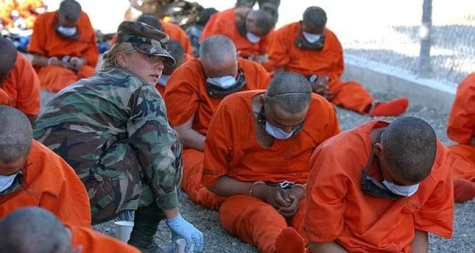In a move that has ignited widespread criticism, outgoing Democrat President Joe Biden authorized the release of 11 Yemeni prisoners from Guantánamo Bay to Oman, reducing the notorious prison’s population to just 15 detainees. This decision, part of Biden’s last-ditch effort to fulfill his campaign promise of closing Guantánamo Bay, has sparked accusations of betrayal, particularly from figures like Tom Homan, former acting ICE Director, who lamented, “Joe Biden really did release them from Guantanamo Bay.”
A Controversial Legacy
Guantánamo Bay, established in the aftermath of the September 11, 2001, attacks, has been a focal point of global debate over justice and human rights. Over two decades, the facility has housed 780 detainees, many of whom were never charged but remained imprisoned indefinitely. Biden’s move to transfer the detainees, including Khalid Qasim, a Yemeni whose artwork from Guantánamo once gained international attention, has reopened old wounds about justice, national security, and the legacy of the prison.
The Pentagon defended the release as a “resettlement,” stating the decision followed a thorough interagency review and was consistent with U.S. national security interests. The released men were sent to Oman, a reliable U.S. partner in such resettlements, with assurances of security measures. Yet, the transfer raises concerns about the potential risks, given Yemen’s ongoing instability and history as a terrorism hotspot.
Biden’s Faltering Mission
Biden’s push to close Guantánamo Bay is part of a broader effort to undo policies that many Democrats view as a stain on America’s reputation. However, the timeline of this move—just weeks before President-elect Donald Trump’s inauguration—has led critics to question the motivation behind the decision. Trump has previously expressed support for expanding Guantánamo’s use, contrasting sharply with Biden’s aim to shutter the facility.
The move also comes amid legal complexities involving detainees like Abd al-Hadi al-Iraqi, whose proposed transfer to an Iraqi prison has sparked lawsuits over fears of inadequate medical care and safety. Meanwhile, the expected guilty plea of Khalid Sheikh Mohammed, the alleged mastermind of 9/11, underscores the continued relevance of Guantánamo in America’s fight against terrorism.
Divided Opinions
While some applaud Biden’s efforts as a step toward justice and closing a dark chapter in U.S. history, others view it as a dangerous gamble. Critics argue the decision undermines national security and fails to honor the memories of 9/11 victims. The released prisoners, held for over two decades without charges, leave behind a legacy of unresolved questions about their role in global terrorism and the accountability of U.S. detention policies.
A Legacy of Controversy
As Biden’s term ends, his actions at Guantánamo Bay stand as a polarizing reminder of his administration’s priorities and the deep divisions within Washington. While his decision may align with Democratic ideals of justice, it has left many questioning whether this final act was a calculated betrayal of American security or a necessary step toward reconciliation with the past. For now, the debate over Guantánamo’s future continues, with Biden’s legacy hanging in the balance.
